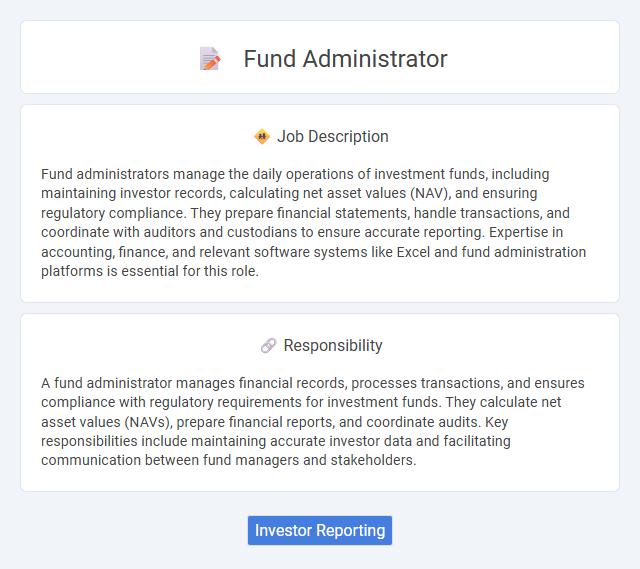
Fund administrators manage the daily operations of investment funds, including maintaining investor records, calculating net asset values (NAV), and ensuring regulatory compliance. They prepare financial statements, handle transactions, and coordinate with auditors and custodians to ensure accurate reporting. Expertise in accounting, finance, and relevant software systems like Excel and fund administration platforms is essential for this role.
Individuals with strong analytical skills and attention to detail are likely well-suited for a fund administrator role, as the job often requires managing complex financial data and ensuring regulatory compliance. People comfortable with multitasking and working in high-pressure environments may find this position more compatible with their abilities. Candidates lacking organizational skills or a keen interest in finance might struggle to adapt effectively to the demands of the job.
Qualification
A fund administrator typically requires a bachelor's degree in finance, accounting, or business administration, complemented by certifications such as CFA, CPA, or ACA to enhance expertise. Proficiency in financial reporting, regulatory compliance, and fund accounting software is critical for accurate management of investment funds. Strong analytical skills and attention to detail ensure effective monitoring of fund performance and investor communications.
Responsibility
A fund administrator manages financial records, processes transactions, and ensures compliance with regulatory requirements for investment funds. They calculate net asset values (NAVs), prepare financial reports, and coordinate audits. Key responsibilities include maintaining accurate investor data and facilitating communication between fund managers and stakeholders.
Benefit
Fund administrators likely provide significant benefits by ensuring accurate and timely financial reporting, which enhances investor confidence. They probably improve operational efficiency through effective management of fund transactions and compliance monitoring. Their role may also reduce risk exposure by maintaining transparent records and supporting regulatory adherence.
Challenge
Fund administrator roles likely involve managing complex regulatory compliance and ensuring accurate financial reporting under tight deadlines. The probability of encountering high pressure to maintain data integrity and handle diverse client demands is significant. Adapting to evolving market regulations and technological advancements may present ongoing challenges in this career.
Career Advancement
Fund administrator roles offer significant career advancement opportunities through gaining expertise in financial reporting, compliance, and investor relations. Mastery in portfolio accounting and regulatory frameworks often leads to promotions into senior management or fund management positions. Continuous professional development and certifications, such as CFA or CPA, further enhance career progression in the fund administration sector.
Key Terms
Investor Reporting
A Fund Administrator specializing in Investor Reporting manages accurate and timely distribution of financial statements, NAV calculations, and performance metrics to investors. This role requires expertise in compliance with regulatory standards, ensuring transparency and trust through detailed, clear reporting. Proficiency in fund structures, accounting software, and data reconciliation supports effective communication and investor relations.
 kuljobs.com
kuljobs.com